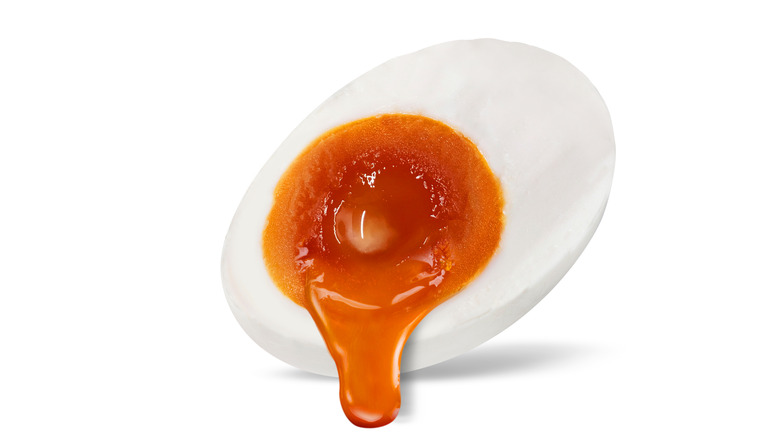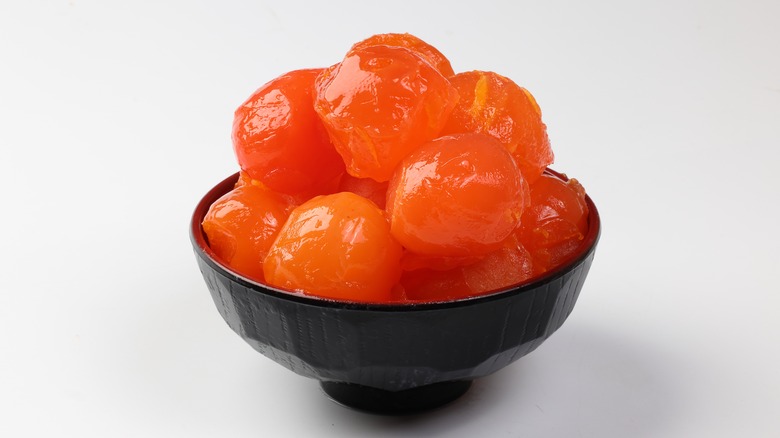What Is A Salted Egg Yolk, And What Does It Taste Like?
In theory, people of Chinese or Southeast Asian ancestry, who've grown up eating salted egg yolk in congee or mooncakes, should be best suited to articulate its taste. But even those familiar with its attributes may have a hard time providing a description of the beloved foodstuff, as it can be difficult to expand beyond, "it is tasty and essential to some dishes." It is the equivalent of asking a French person to explain the taste and importance of butter.
The comparison is apt because salted egg yolk also has a 'je nais se quois' quality. More people are talking about it now and some media outlets in the United States, like The Takeout, are even calling 2023 "The Year of Salted Egg Yolk." So what is it, exactly?
Salted egg yolk is akin to a condiment made from preserved duck eggs. Historically, we can trace the practice of salting eggs back to China in the year A.D. 5. There are three ways to achieve this: brine it in a salt solution, dry-brine it with a layer of coarse salt, or coat it with a paste of sand, mud, or clay. Today, the most efficient method is to brine the eggs in a concentrated salt solution. You can even buy the salted yolk separately or in powdered form.
Salted egg yolk is a source of rich, umami flavor
So what is so appealing about an egg dipped in salt? The first point is that it should not simply taste like an egg doused in salt. Nor should it evoke memories of soggy egg sandwiches. It should have the depth of a preserved food that has been transformed by salt, like the difference between cucumbers and pickles. When cooked, the egg whites might taste similar to a regular boiled egg but the yolk should have a rich, buttery, and creamy aftertaste. The yolk also should have a bright yellow-orange color with a crumbly, grainy texture that still oozes with a jelled, sauce-like consistency.
The second point is the evolution of salted egg yolk. Just like its fellow cured foods like sauerkraut or fermented shrimp, it started as a way for people to preserve food using readily available elements. But today, people use it as a source of umami or to amp up different flavors. As Vinny Nguyen, manager of DaVien Cafe & Dessert explained to Thrillist, it is "to counterbalance sweet or neutral flavors." This explains why, unlike a regular boiled egg, a salted egg or a salted egg yolk is not really a stand-alone snack. On its own, the taste is overpowering, akin to eating a block of parmesan or anchovies straight from the jar.
There's no limit to how you can use salted egg yolk
The best way to think about salted egg yolk is to consider it as part of an ensemble and use it in a range of traditional and innovative ways, from ice cream to boba drinks. In Hong Kong and Singapore, people make a beeline for food that heavily features the coveted ingredient, such as salted egg crabs and the famed salted egg yolk lava croissants with their molten centers. These are fairly rich dishes — occasional food rather than everyday food.
But sometimes the flavor can be subtle, particularly in snacks or desserts typically found in Asian supermarkets. For example, in potato chips, crackers, or even salmon skin coated with salted egg, the yolk acts similarly to MSG in its flavor enhancement. Some innovative bakers have also used it in cakes and pastries, like Kitsby's molten salted egg cake.
It appears that if a dish requires an egg or egg yolk, there is an opportunity to consider a salted egg yolk instead. Maybe topped on smashed avocado or a garden salad — the possibilities are seemingly endless.


